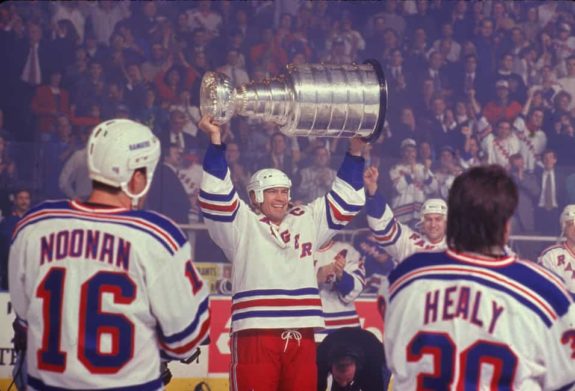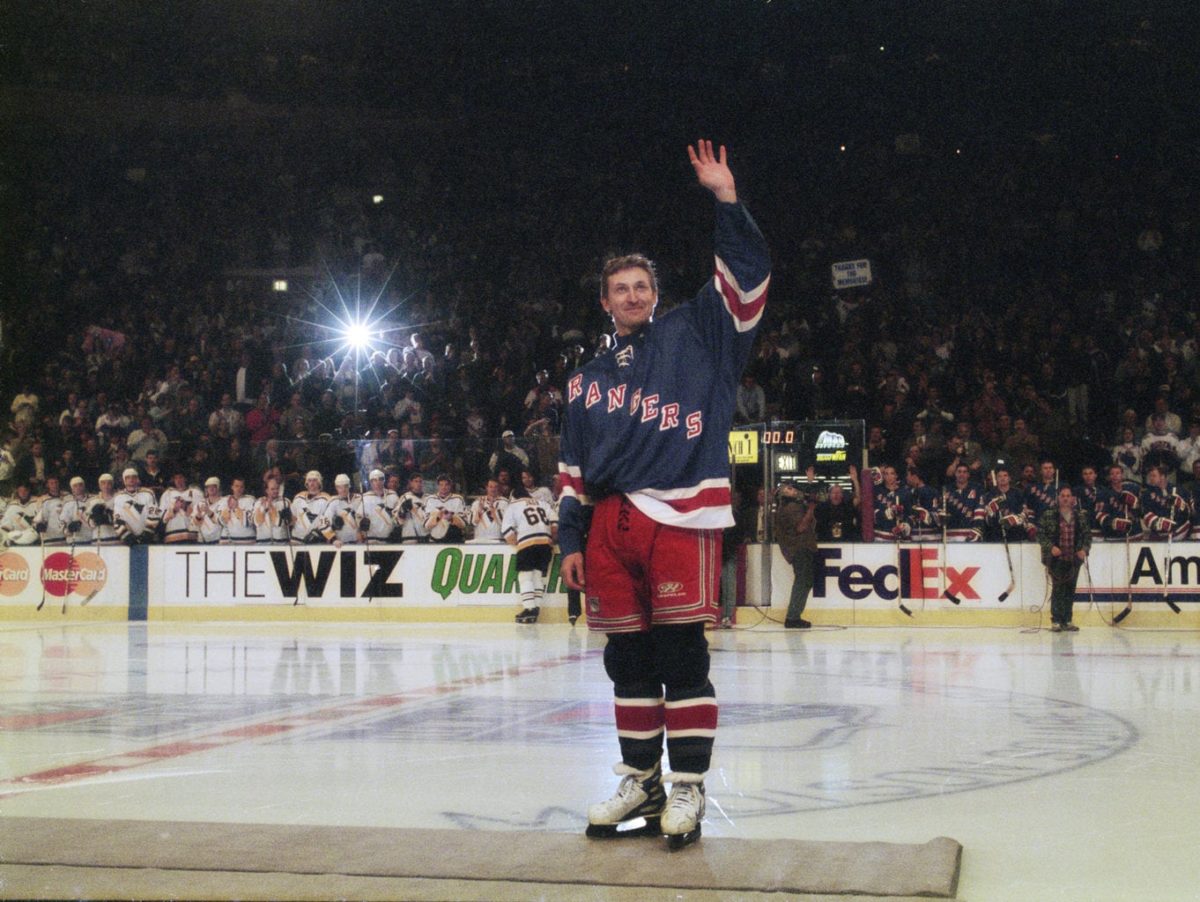A decade of futility for the New York Rangers that started in the late 1990s began with one event in July 1997. It wasn’t a game the Rangers lost, a trade they made, or a free agent they signed (although there would be many to follow).
No, the day that led to seven straight non-playoff seasons for the Broadway Blueshirts was the day their captain walked away.
Mark Messier to the Canucks
When Mark Messier signed with the Vancouver Canucks as a free agent in the summer of 1997, it closed the book on one of the most successful eras in Rangers’ history. Although Messier’s first tour of duty in New York only lasted six seasons (he would return for four more seasons from 2000-04), he became a legendary figure in New York.
You may also like:
- New York Rangers’ 4 Best Contracts for 2024-25
- Rangers Need Miller/Schneider Pair to Take Big Step in 2024-25
- A Hockey Fan’s Travel Guide to New York City
- Rangers’ Zibanejad Must Prove Doubters Wrong With Bounce Back in 2024-25
- 9 NHL Teams That Missed in Free Agency
From 1991-97, the Rangers made the playoffs five times, won two Atlantic Division Championships, two Presidents’ Trophies, one Eastern Conference championship, and the Stanley Cup in 1994. When the final buzzer sounded after Game 7 of the Final in 1994, Rangers’ play-by-play announcer Sam Rosen said “This one will last a lifetime!” The same could be said for all of the memories Messier gave to the fans in New York.

That is why it was so hard for many fans to fathom that ‘The Captain’, their captain, would be allowed to walk away as a free agent. For a city and an organization that was (and still is) synonymous with giving out large contracts to lure free agents, why wouldn’t the Rangers be willing to overpay to keep Mark Messier in New York?
Why Did Mark Messier Leave?
Depending on who you ask, the reasons for the messy divorce between Messier and the Rangers are very different. If you ask Messier, or at least if you asked him fifteen years ago, one of the reasons that he decided to leave was that he felt he was “disrespected” by Garden management.
In an article in the New York Times, Messier said, “When July 1 came around, other teams were allowed to come in my living room, and things changed…I guess they (the Rangers) felt they didn’t need to, that my loyalty (to New York) was so strong.” (from ‘A Bad Feeling Chases Messier Out of New York,’ New York Times, 07/29/1997)
Rangers’ president and general manager Neil Smith’s offer to Messier of a one-year $4 million contract was not well received by the Rangers’ captain. In Jeff Z. Klein’s biography of Messier, the author writes “he (Messier) was telling reporters how slighted he felt by what he thought was the Rangers’ deliberate insult.”
According to Rangers’ management, Messier’s decision to leave New York was all about the money that Vancouver threw his way. While it was reported that teams such as the Islanders, Capitals, and Red Wings all offered deals similar to the Rangers’ offer, the Canucks offered Messier a minimum of three years at $6 million per year, with an option for two more years at $5 million per year.
Mark Messier as a Cup-less Canuck
After Messier signed with the Canucks, Madison Square Garden CEO Dave Checketts rhetorically asked “How long should we pay for that Cup?” The Rangers felt that he wasn’t worth the money, and fifteen years later, it is likely that every Canucks fan will agree.
However, even with Wayne Gretzky for two more seasons, the Rangers missed Messier’s presence in the lineup and in the locker room. Maybe things would have turned out differently if Joe Sakic made it to Broadway.

After losing Messier to the Canucks, the Rangers signed the Avalanche center to a three-year $21 million contract. But the Avalanche decided to match the Rangers’ offer for Sakic, who was a restricted free agent.
Without Mark Messier, the Long Drought
The Rangers and their fans would like to forget the years that followed. Seven years came and went without a playoff appearance. The carousel of mercenaries that made their way to the Garden, including Theo Fleury, Eric Lindros, Pavel Bure, and Messier himself in 2000 as a 39-year-old, just highlighted how dysfunctional that time period in Ranger land was.
But it all goes back to the day that Messier left, and a situation that, in hindsight, both sides would do differently.
This article was originally published in July, 2012.
Sign up for our NHL History Substack newsletter


You’re 20. When Mess left in 1997, he was playing on fumes, despite scoring over 80 pts. The one season he played with Gretz, Gretz made much more of an impact on that team. I think Mess’ ego couldn’t handle that and helped him with the decision to leave. The years that followed, both in Van and NY, showed how little he had left. His second turn in NY was just godawful. He played shifts when HE wanted to and was just a shell of the player he was. I was glad he retired as a Ranger but those last few years were the worst for a fan of this team.
He felt disrespected? I think 18 million dollars guaranteed with the possibility for another 10 just might have helped him in the the decision process. I’d move to Vancouver too for that kind of money!
Michael, really a well written and informative article. Good Job.
Thank you, Pat. Much appreciated.